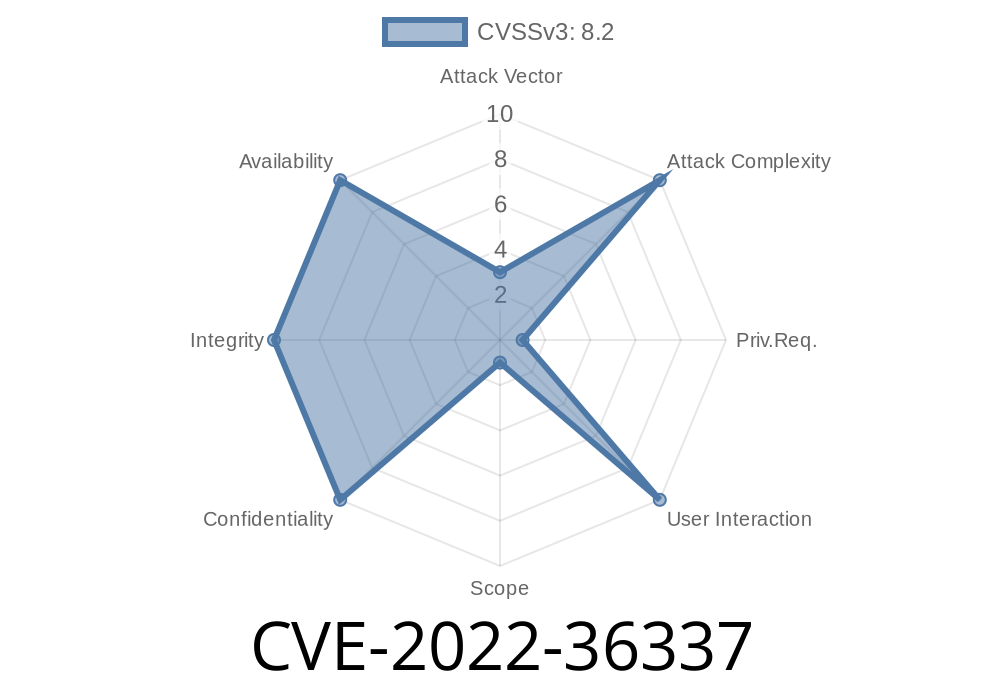In 2022, security researchers found a critical buffer overflow vulnerability in the InsydeH2O UEFI firmware (specifically versions with kernel 5. through 5.5). This issue, tracked as CVE-2022-36337, could let attackers with OS-level access achieve arbitrary code execution in the system's early boot process—an exceptionally powerful capability.
In this post, we’ll break down the vulnerability in simple, straightforward terms: what causes it, why it’s dangerous, and how it might be exploited—along with code snippets and references to the original reports.
How the Vulnerability Works
Insyde's InsydeH2O is widely used UEFI firmware for consumer and enterprise devices. Part of its job is managing UEFI variables, which can be created, read, and updated from both the firmware and the operating system.
Inside the firmware, the MebxConfiguration driver is responsible for managing certain configuration settings. The vulnerability lies in how this driver *reads* a UEFI variable. It makes unsafe assumptions about the variable's size, leading to a classic stack buffer overflow.
If an attacker creates or updates a specific UEFI variable to a maliciously long value from within the operating system (Windows or Linux), they can overflow the stack buffer when firmware code later reads the variable during boot. This can corrupt execution flow, potentially allowing the attacker to run arbitrary code with the highest firmware privileges.
Technical Breakdown
Let's see how this bug happens using a fictionalized, simplified C code snippet that shows a vulnerable pattern (not the actual Insyde source, but representative):
// Vulnerable code in MebxConfiguration driver (illustrative)
VOID ReadMebxVariable() {
CHAR8 Buffer[128]; // fixed-size stack buffer
UINTN BufferSize = sizeof(Buffer);
// GetVariable reads a UEFI variable
Status = gRT->GetVariable(
L"MebxSetup", // VariableName
&MebxGuid, // VendorGuid
NULL, // Attributes (not needed here)
&BufferSize, // IN/OUT: size of buffer, gets size of variable
Buffer // Out: buffer where value is stored
);
// ...process Buffer...
}
What's wrong here?
If the attacker previously set the MebxSetup variable to be, say, 300 bytes from the OS, the firmware call above will write 300 bytes into a 128-byte buffer. This is a stack overflow! The extra data overwrites stack values—potentially the return address, function pointers, or other control data—making it possible to hijack execution.
Exploit Details
While the accurate exploitability depends on firmware stack layout, protections, and hardware features, the general attack technique would go like this:
1. Gain OS Access: Attacker must have administrative/root privileges in Windows or Linux.
2. Create Malicious UEFI Variable: Use OS-level tools (like efivar, Windows UEFI API, or custom code) to set MebxSetup (or a similarly targeted variable) with oversized, carefully crafted data.
3. Trigger Overflow: On the next reboot, when firmware loads and the MebxConfiguration driver reads the variable, its buffer overflows.
4. Hijack Execution: If successful, the attacker’s payload can execute in firmware context—allowing things like Secure Boot bypass, persistent malware, or full system compromise even before the OS starts.
Proof-of-Concept (PoC) Variable Write in Linux
# Example: Write a 500-byte value to the MebxSetup EFI variable using efivar (dangerous!)
sudo bash -c 'head -c 500 </dev/zero | od -An -tx1 | tr -d " \n" > payload.hex'
sudo efivar --write --name MebxSetup-<guid> --datafile payload.hex
*(Replace <guid> with the UEFI variable’s GUID; consult efivars for actual GUIDs present.)*
Impact
The ability to run code in firmware is among the most severe classes of vulnerabilities. This is because:
References and Original Resources
- NVD: CVE-2022-36337
- Insyde Security Advisories
- Eclypsium Research on UEFI Attacks
- UEFI Secure Coding Guidelines
Mitigation
- Update Firmware: Insyde and OEM vendors released BIOS/firmware updates that check input lengths correctly before copying data, preventing out-of-bounds writes.
- Restrict OS Access: Only install trusted software and apply OS protections to reduce malware risk.
Conclusion
CVE-2022-36337 is a textbook demonstration of why defensive coding, even in deep system firmware, is essential. Always validate input lengths before copying data—especially in environments as critical as UEFI.
If your device is running an affected version of InsydeH2O, check with your PC or motherboard manufacturer for an updated BIOS/firmware, and apply it as soon as possible. For more insight into UEFI threats, visit resources like Eclypsium’s UEFI threat research.
Timeline
Published on: 11/23/2022 03:15:00 UTC
Last modified on: 11/30/2022 15:27:00 UTC
